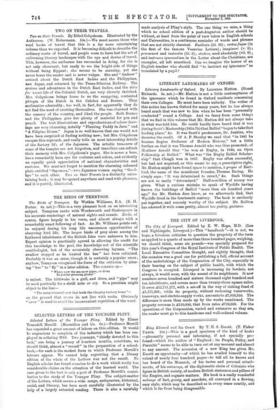LITERARY LANDMARKS OF OXFORD.
Literary Landmarks of Oxford. By Laurence Hutton. (Grant Richards. 55. net.)—Mr. Hutton is not a little contemptuous of the ignorance which he found in Oxford residents concerning their own Colleges. He must have been unlucky. The writer of this notice has known Oxford for many years, but he has always heard much that was new to him when he has been "personally conducted" round a College. And we fancy from some things that we find in this volume that Mr. Hutton did not always take in what was told him. He could hardly have heard that it was during Scott's Mastership (1854-70) that Balliol" began to take that leading place," Fcc. It was Scott's predecessor, Dr. Jenkins, who deserves the credit. Of A. P. Stanley we read that "in 1841 he became Regius Professor of Modern History," but a little further on that it was Thomas Arnold who was thus promoted; of Matthew Arnold that "he won at Rugby, in 1840, an Open Fellowship at Balliol." What was "the Rugby Balliol Scholar- ship" that Clough won in 1837. Rugby was often successful, but had not acquired, as this seems to say, a prescriptive right. Mr. Hutton might have found space to mention, a propos of Hert- ford, the name of the munificent founder, Thomas Baring. He simply says : "It was determined to revert," dre. Such things are not so easily "determined!' Half-a-million of money was given. What a curious mistake to speak of Wycliffe having known the buildings of Balliol "more than six hundred years ago," for Mr. Hutton does know, as we afterwards find, that Wycliffe lived in the fourteenth century. The book is carelessly put together, and scarcely worthy of the subject. Mr. Railton has adorned it with some pretty, almost too pretty, pictures.






























































 Previous page
Previous page